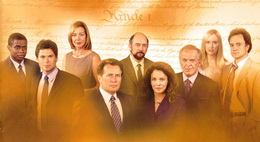
Only the second episode ever of The West Wing, and we have an episode with a title in Latin and a discussion of an obscure Latin phrase. This show is not afraid to parade its intellectualism - or, put another way, it likes to show off.
CJ is insisting that Bartlet was badly defeated in Texas because he made a joke about big hats. Bartlet is equally insistent that his joke had nothing to do with it and they would have been just as badly beaten without it, and explains this in the following manner:
Bartlet: 27 lawyers in the room. Anybody know "Post hoc, ergo propter hoc"? Josh?
Josh: Uh, uh, "post" - after, after hoc, "ergo" - therefore, "After hoc, therefore" something else hoc.
Bartlet: Thank you. Next?
Josh: Well, if I had gotten more credit on the 443...
Bartlet: Leo?
Leo: "After it therefore because of it."
Bartlet: "After it therefore because of it." It means one thing follows the other, therefore it was caused by the other. But it's not always true. In fact, it's hardly ever true.
Just because something happens after something else, it doesn't mean there's a direct causal relationship between the two, Bartlet insists, and in the case of his big hats joke it's probably true. But 'Post Hoc, Ergo Propter Hoc' is also the episode's title and in the case of the other storylines, it's harder to tell. Josh makes a deal that directly results in Mandy losing her only client, which then results in Leo persuading Josh to hire her (a very, very bad idea which they will quickly regret - my friend and I have a private theory that Leo had Mandy shot at the end of season 1 when she went to Mandyville, as they were all so fed up of her - she was infuriating). The storylines involving Sam and Laurie the call girl and CJ and Hoynes don't really have anything to do with it, they're part of ongoing story arcs that are stretched across the first season. The most important and most memorable storyline in the episode relates to Bartlet's discomfort, as a Commander-in-Chief who's never served in uniform, with violence and with the military. By the end of the episode, however, the death of his personal physician (whose fate is sealed when he turns up, is super-nice to everyone and starts showing people pictures of his new baby) has completely turned Bartlet around. Rather than feeling uncomfortable with violence, he
 is eager to 'blow them off the face of the Earth with the fury of God's own thunder'. Bartlet's change in attitude is directly caused by Morris's death - post hoc, ergo propter hoc.
is eager to 'blow them off the face of the Earth with the fury of God's own thunder'. Bartlet's change in attitude is directly caused by Morris's death - post hoc, ergo propter hoc.Bartlet's use of Latin in this episode seals some of his biggest character traits. Bartlet only appeared in a few minutes of the pilot, because his character was only supposed to make occasional guest appearances, but it was so successful (and Sorkin realised that a programme set in The West Wing without the President wouldn't be so much fun) that from this episode on, he's a regular character. In the pilot, we saw him demonstrate his Christian faith and his protective attitude towards his family and friends, and he has the best entrance in television history, as he walks in to an argument about which Commandment is which, to declare 'I am the Lord thy God, and thou shalt have no other god before me'. (The best entrance in movie history, if you're interested, is Jack Sparrow walking off the sinking boat in Pirates of the Caribbean).
This episode, though, is where we really learn who Bartlet is, other than a liberal Catholic. Bartlet is a person with a bad sense of humour. Bartlet is a caring boss who asks after his employees' children. Bartlet has a Nobel prize and a PhD in Economics but has never served in the armed forces. And Bartlet is a man who will randomly answer his staff's concerns with Latin. Josh does pretty well with his attempt at translation - 'hoc' is one of those Latin things that just doesn't translate very well into English in this case. We just don't use demonstrative pronouns in that way. Bartlet demonstrates both his great learning and his rather irritating habit of displaying that learning at every opportunity here but, unlike Yes, Minister, there's a sense that we are genuinely intended to admire this quality, annoying as it may be. Bartlet's knowledge of Latin is the result of his privileged upbringing, but whereas, when Sir Humphrey uses Latin, his privileged upbringing is the only thing he's demonstrating, Bartlet's use of Latin is more about demonstrating his interest in knowing as much as possible about the world around him. This episode was made in 1999; from November 2000, this quality only became more important, as the show made it clearer and clearer that it valued the pursuit of knowledge, intelligence and the thirst for a greater understanding of the world, culminating in Bartlet's presidential race against the rather less bright Governor Ritchie. Education itself is only part of it - Donna spends 6 years questioning Josh about everything, until eventually she is qualified to run the First Lady's office. But Bartlet's Latin is an early sign of this agenda - it's annoying, it's slightly ridiculous but it's also, like his Nobel Prize, something to be admired.
Comments
Post a Comment